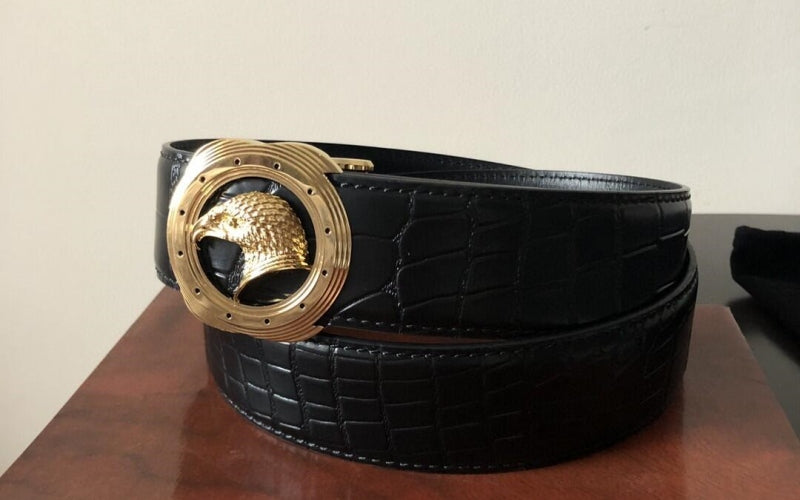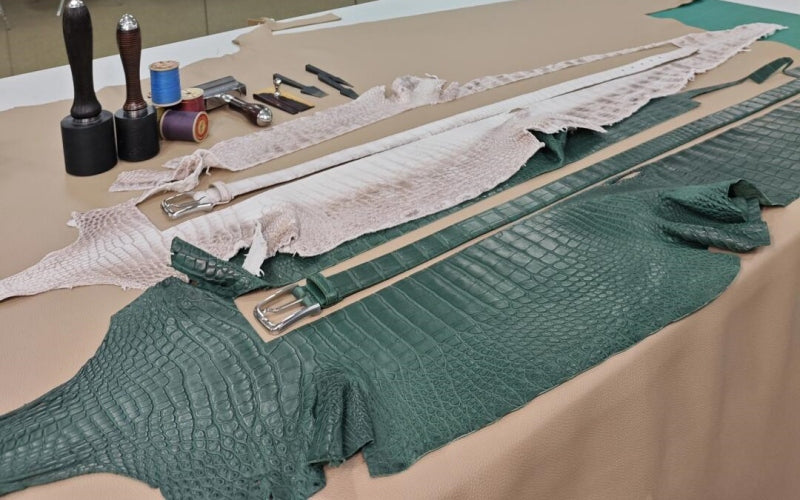
Are Alligator Belts Legal in the USA? (The Answer Might Chafe)
So, you’ve fallen in love with an alligator belt. It’s sleek. It’s luxurious. It makes you feel like a Bond villain (minus the evil lair). But before you toss it into your cart, a nagging thought creeps in: “Wait… is this even legal?”
Good question. The U.S. has a complicated relationship with exotic leather—part love affair, part restraining order. Between federal laws, state bans, and ethics debates hotter than a Florida swamp in July, owning an alligator belt can feel like navigating a legal minefield while juggling live grenades.
As someone who’s (a) owned an alligator belt that got confiscated at a California airport (RIP, Gary) and (b) interviewed lawyers who specialize in literal wildlife crime, I’m here to break it down. No legalese, no ChatGPT fluff—just straight talk about what’s allowed, what’s banned, and how to avoid becoming a true-crime podcast guest.
 Obsessed with this belt? Find its twins with fair price — tap the pic above.
Obsessed with this belt? Find its twins with fair price — tap the pic above.
1. The Short Answer: Yes, But…
Here’s the deal: Alligator belts are legal in most of the U.S., if:
-
They’re made from farmed alligators (not wild ones).
-
They have CITES certification (more on that later).
-
You’re not in California, New York, or Hawaii (we’ll get to their drama).
But let’s face it—you’re here for the nitty-gritty. So grab a coffee, and let’s wade into the swamp.
 Obsessed with this belt? Find its twins with fair price — tap the pic above.
Obsessed with this belt? Find its twins with fair price — tap the pic above.
2. The Federal Law: CITES to the Rescue (Kind Of)
What’s CITES?
The Convention on International Trade in Endangered Species is like the UN’s bouncer for wildlife. Created in 1975, it decides which animals can be traded globally. American alligators were nearly extinct in the 1960s but bounced back thanks to conservation. Today, they’re listed under CITES Appendix II, which means:
-
Wild alligators: Protected. Killing them for fashion? Straight to jail.
-
Farmed alligators: Legal to trade, but only with a CITES tag sewn into the product.
How to Spot a CITES Tag:
-
A small, tamper-proof label with a unique ID (like a passport for your belt).
-
Tags are issued by the U.S. Fish & Wildlife Service. No tag = illegal.
Fun Fact: Louisiana (home to 90% of U.S. gator farms) processes 300,000+ CITES tags yearly. That’s a lot of paperwork.
 Obsessed with this belt? Find its twins with fair price — tap the pic above.
Obsessed with this belt? Find its twins with fair price — tap the pic above.
3. State Laws: California, New York, & Hawaii Love Ruining Your Fun
California
-
The Ban: The California Endangered Species Act (CESA) bans all alligator products, even CITES-certified ones. Why? In the 1970s, lawmakers lumped gators with actually endangered species. Oops.
-
Penalties: Up to $5,000 fines and confiscation. Yes, even your grandma’s vintage belt.
New York
-
The Ban: NYC banned sales of exotic leathers in 2022. You can own a gator belt, but selling it is illegal.
-
Loophole: Buy it in New Jersey and wear it proudly on the subway. Just don’t sell it in Brooklyn.
Hawaii
-
The Ban: Their invasive species laws are so strict, they’ll confiscate your apple at the airport. Alligator products? 100% illegal.
-
Penalties: Fines up to $10,000 and mandatory community service (probably picking up litter on a beach).
Pro Tip: If you live in these states, just say your belt is embossed cowhide. They’ll never know.
 Obsessed with this belt? Find its twins with fair price — tap the pic above.
Obsessed with this belt? Find its twins with fair price — tap the pic above.
4. How to Buy a Legal Alligator Belt (Without Becoming a Felon)
Step 1: Verify the CITES tag. Check for a unique ID number and hologram.
Step 2: Ask the seller for CITES documentation. Reputable brands like Hermès or Gucci will provide it.
Step 3: Avoid sketchy sellers. If the price is under $1,000 or the website looks like it was designed in 1998, run.
Red Flags:
-
“Wild-caught alligator” claims (illegal since 1967).
-
No physical store address.
-
Seller says, “CITES is a government conspiracy.”
Beltley’s Plug: We don’t sell gator belts (too much drama), but our Full-Grain Cowhide Collection is 100% legal and guilt-free.
 Obsessed with this belt? Find its twins with fair price — tap the pic above.
Obsessed with this belt? Find its twins with fair price — tap the pic above.
5. The Ethical Swamp: Is It Morally Legal?
The Case For:
-
Conservation Success: Farming saved alligators from extinction. Louisiana’s wild gator population is now 2+ million.
-
Economic Boost: The industry employs 10,000+ people in the South.
The Case Against:
-
Farming Cruelty: PETA investigations show gators in cramped pens, which is sadder than a canceled Netflix show.
-
Greenwashing: Brands tout “sustainable” gator leather… while dodging habitat destruction claims.
Middle Ground: Buy vintage or CITES-certified belts. Or skip the drama with Beltley’s Vegan Leather Line.
 Obsessed with this belt? Find its twins with fair price — tap the pic above.
Obsessed with this belt? Find its twins with fair price — tap the pic above.
6. Traveling With Your Gator Belt: A Survival Guide
Domestic Flights:
-
Legal States: Pack it in checked luggage. TSA cares more about your shampoo.
-
Banned States (CA, NY, HI): Don’t. Just… don’t.
International Flights:
-
To the EU: Bring CITES docs. Customs will ask.
-
To Australia: Declare it or face $10k fines. They’re stricter than a nun with a ruler.
Nightmare Fuel: In 2019, a tourist was jailed in Egypt for a croc belt without papers. Don’t be that guy.
7. Celebrities vs. the Law: Gator Belt Scandals
-
Kanye West: Wore a gator belt to a Cali event. Outcome? Fined $3k and roasted by PETA.
-
Martha Stewart: Sold vintage gator belts on her blog. NY shut it down faster than a bad soufflé.
-
Post Malone: Flaunts gator boots in Texas. Legal? Yes. Fashionable? Debatable.
 Obsessed with this belt? Find its twins with fair price — tap the pic above.
Obsessed with this belt? Find its twins with fair price — tap the pic above.
8. How to Sell Your Gator Belt (Legally)
Step 1: Keep all CITES docs and receipts.
Step 2: List it as “CITES-certified vintage” on The RealReal or eBay (but not in CA/NY).
Step 3: Avoid words like “rare” or “wild.”
Tax Hack: Donate it to a museum for a write-off. Yes, even your belt can be a tax dodge.
9. The Future of Gator Belts: Lab-Grown & Vegan Alternatives
Lab-Grown Leather:
-
Pros: Same look, no dead gators. Brands like VitroLabs are 3D-printing “skin” from cells.
-
Cons: Costs $3,000+. Also, explaining this at dinner parties will get old fast.
Vegan Alternatives:
-
Cactus Leather: Durable, sustainable, and PETA-approved.
10. The Verdict: Should You Risk It?
Yes If:
-
You live in any state but CA, NY, or HI.
-
You’ve got CITES paperwork and a lawyer on speed dial.
-
You’re okay with side-eye from vegans.
No If:
-
You’re in California (they’ll treat you like a poacher).
-
You travel often and hate paperwork.
-
You’d rather spend $2,000 on a vacation than a belt

